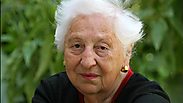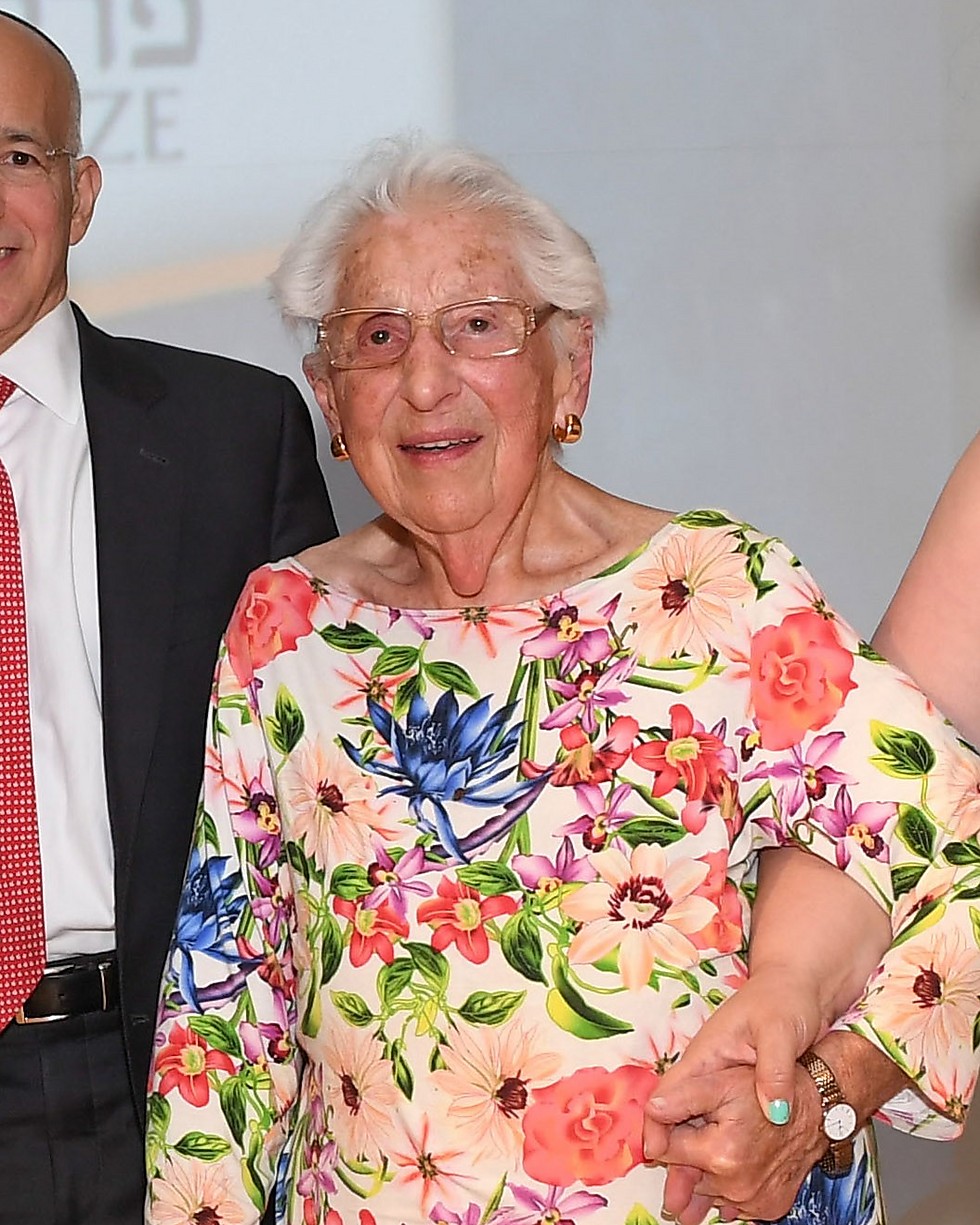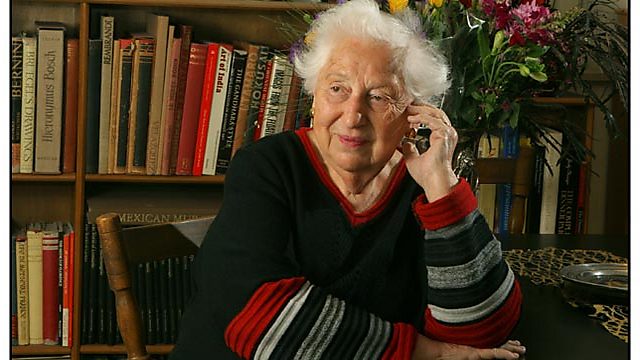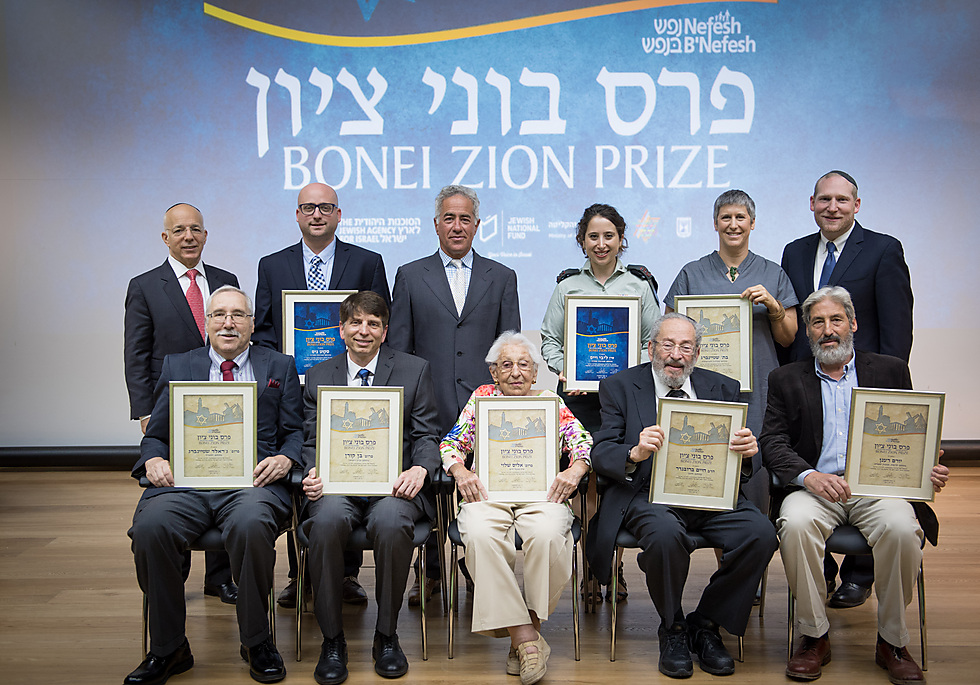

Mother of religious feminism: Israel is a backward country
She has trouble praying from a Siddur, laments that women in positions of power are still a minority and refuses to accept the fact that matters of state and religion are solely in the hands of men. At the age of 91, upon being awarded the Nefesh B'Nefesh Bonei Zion Prize, Prof. Alice Shalvi paints a grim picture of women’s status in the Israeli society.
I met with Prof. Alice Shalvi at her home in Jerusalem’s Beit HaKerem neighborhood. After a short introduction, the tables were turned and she began showering me with questions: “You’re ultra-Orthodox? Wow! When did you go into journalism? How did your family react?” Then she stopped, smiled and said: “Looks like I’m the one interviewing you.”
An interview with Prof. Shalvi is a trip through history. It gives you perspective of decades from a woman who was here when it all began, and it’s no wonder that her set of trophies—which includes the Israel Prize—grew bigger recently with the Nefesh B'Nefesh Bonei Zion Prize. Prof. Shalvi rarely gives interview, and the picture she paints is quite grim.
“Israel is a backward country. There has been a regression since the 1970s. When I look at what’s happening here, it’s sad. On the one hand, the number of educated women exceeds the number of (educated) men, and it’s amazing even on the doctoral candidates’ level. It wasn’t like that before. On the other hand, the percentage of women in university faculties has remained almost unchanged. At least we have, thank God, university presidents who are women.
“I remember applying for the dean's position in 1972 and being told, ‘But you’re a woman!’ Like how can a woman even consider such a position? That may have changed, but when it comes to manning positions of authority in the state, the percentage of women doesn’t reflect their relative share in the population or their level of education and skills. So what’s happening here? And why?”
Like Alice in Wonderland, Alice Shalvi keeps running and asking, “Are we nearly there?” And just like that Alice, who was told “if you wish to go anywhere you must run twice as fast,” she feels “we still have to run faster.”
“Feminism for me is a point of view,” she says. “It’s the real thing, it’s equality between all human beings in a society where there are no privileges for one group or another. It’s sort of like what it says in our Declaration of Independence, which isn’t being implemented, unfortunately. That is, in my opinion, the real revolutionary thinking of feminism. Since it pursues equality, it has quite a bit of pacifism in it. After all, what creates conflicts between people? When each person looks for his or her place in the world, and someone else comes along and gets in the way. For me, socialism, pacifism and feminism are integrated together.”
‘I had nowhere to pray’
Alice Shalvi’s biography can fill up a feature film. She was born in Germany in 1926 and fled to London with her family in 1933, at the very last minute. She has a degree in English literature from Cambridge University and a degree in social work from the London School of Economics. In 1949, she immigrated to Israel and was “recruited” to the feminist movement by the late Pnina Pelei. She has been part of the movement ever since.
Shalvi was also an associate professor at the English literature department at the Hebrew University of Jerusalem and principal of the Pelech school for religious girls, which turned into a prestigious and groundbreaking institution under her leadership. She founded the Israel Women's Network, won quite a few awards—including the Israel Prize, the Yakir Yerushalayim (“Treasured Jerusalemite") title and the Nefesh B'Nefesh Bonei Zion Prize, published the book “Jewish Women: A Comprehensive Historical Encyclopedia” and moved from Orthodoxy to the Conservative/Masorti Movement.

Today, Shalvi serves as president of Kehilat Zion (the Zion Congregation). “It’s not a Conservative community,” she explains, “but it’s part of the Conservative Movement. The truth is, I didn’t find a congregation I was satisfied with spiritually. I kept complaining to Tamar (Rabbi Tamar Elad-Appelbaum), who was a student of mine at Pelech and at the Schechter Institute, that I had nowhere to pray. I had no place where I felt spirituality, where I felt satisfied with the spiritual content. For years, she kept saying she would start a congregation for me, and four years ago it happened.
“The Kehilat Zion vision and what makes them so unique is the perception of Israeli Judaism, which combines all denominations and ethnic groups, and somewhat returns to the form of prayer (that was practiced) in the Land of Israel in ancient times. That’s what sets it apart from the Conservative Movement, which is why I said it’s a special place. We are people who come from different backgrounds and pray together. I find communality very important.”
With all the pessimism, what do you consider the most important development in feminism today?
“What is happening with all types of religious women,” she states decisively. “It’s the result of a new generation of educated women, the scholars’ students, which is why at Pelech I found it so important to stress that there is not a single area in life that you should be banned from just because you are of female gender. Torah studies, science—don’t let them tell you it’s ‘not for women,’ if that’s what you aspire to do, and if you’re capable. The fact that there is a generation of women who are completely equal to men in terms of their knowledge and biblical education—while men are still considered an authority—changes and has changed everything.
"I’m very happy to inform you that I have three students who have undergone halachic training. Two of them have been ordained as rabbis, Avital Hochstein and Tamar Elad-Appelbaum, and the third, Malka Puterkovsky, wasn’t ordained as a rabbi and insists on referring to herself as ‘a woman of Halacha.’ These are three examples women who received the title of rabbi.
“The Orthodox Rabbinate is beginning to accept the idea of women’s partnership. The problem is that the moment an Orthodox rabbi dares to say a word on the issue, everyone immediately jumps up and says: He’s not Orthodox.”
‘How do we define religiousness?’
If you’re asking yourself how Shalvi deals with this contradiction in her camp as a religious woman, she will reply with a question: “Am I a religious person? And how do we define religiousness? A person who keeps the Halacha? What Halacha? We all aspire to reach something that is beyond human. The undefinable cannot be defined. We don’t know what God is. Each person has his own perception.
“I can say I perceive divinity, the ‘holy spirit,’ as something that makes us aspire to be more than we are. It cannot be defined in a physical sense, and definitely not in a scientific sense. I find it in music, in meditation—the feeling that we live in a universe where there is room for everyone and life isn’t reduced just to matter.”
Shalvi finds it difficult to pray from the Siddur. “The acceptable prayer with the view of the divine figure as a father, a king, a totally male figure—it’s a language I can’t relate to. I have trouble praying using it. In meditation, your soul looks for the superhuman, without words. For years, I felt horribly guilty over the fact the Siddur doesn’t cater to my needs. I am very fond of the prayer in public, prayers like Hallel, which reflect this connection between man and God. In the Sistine Chapel, Michelangelo expresses just that: Almost touching, but not touching. The movement upwards, not the connection.”
‘We are a halachic state’
Asked what should be done to change the current social picture, Shalvi points to two main factors: “It won’t change until there is peace and the army is less central. With all the advancement of women in the army, it’s a male-dominated organization. Fighting is a male activity. The army’s place as far as our life is concerned leads to frivolity. For example, why can a person who was chief of staff be in politics? What qualifies him for that? I don’t know if every general can be prime minister, but it’s somehow obvious that he is a ‘macho man’ and he can.
“The second thing is the Rabbinate’s control, which leaves conversions and divorce in its hands. There is one establishment that doesn’t represent the entire population but fully controls it: The Rabbinate. It’s a completely male-dominated establishment, which doesn’t even include one woman. Is there not a single woman who can make halachic rulings? Is there not a single woman who can be a religious judge? Nothing?
“According to my views, there shouldn’t be a religious establishment. It contradicts the deep-rooted Jewish principle of ‘Ashe Lecha Rav’ (find a rabbi who is right for you). Choose your authority on your own, if at all. Marriage and divorce are not necessarily a religious matter. Civil marriage would have solved quite a lot. The problem in Israel is that there is no separation between the religious establishment and politics. In Israel, for example, the Haredi parties are always the deciding factor. Not everyone wants to see the Rabbinate decide on their way of life. Israel belongs to everyone, and everyone should be represented.”
Are we a halachic state?
“Yes, definitely, and I am against it of course. We are a halachic state because of the Rabbinate’s power, and it is controlled by the Haredi public. The Ashkenazi rabbis are becoming increasingly Haredi. These two centers—the army and the Rabbinate—are preventing the advancement of women in Israel.”
The Nefesh B’Nefesh Bonei Zion Prize is awarded annually to outstanding Anglo olim, both new and veteran, who have made a significant contribution to the State of Israel.

















